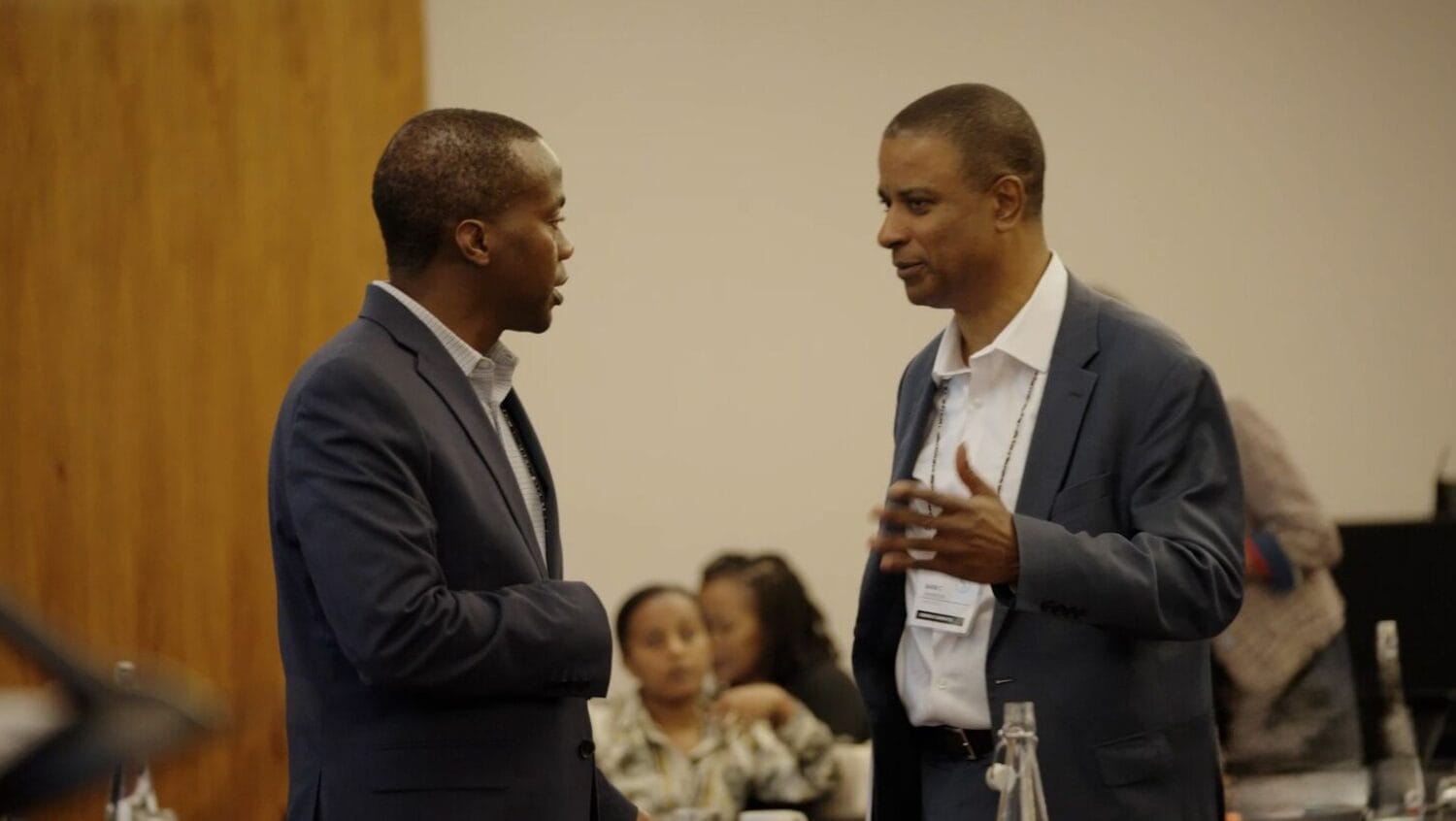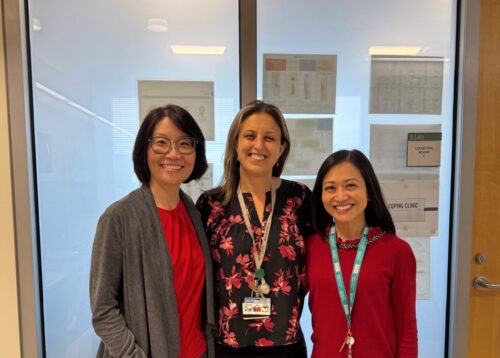Practicing 'Sawubona' to Build a Legacy of Mental Health Care in Africa and the Diaspora
June 7, 2024

Boston Medical Center
(From L to R): Bonga Chiliza, MBChB, FCPsych, PhD greets David Henderson, MD.
Boston Medical Center's Chief of Psychiatry co-founded the Africa Global Mental Health Institute to address the urgent need for culturally sensitive mental healthcare on the continent and beyond.
There’s a word in Zulu, “sawubona,” that means “I see you.” But it goes much deeper than just physical sight. It means that one recognizes the worth, dignity, and humanity of another person. Sawubona is the spirit behind the Africa Global Mental Health Institute (AGMHI), co-founded by Boston Medical Center’s Chief of Psychiatry David Henderson, MD. The institute was founded eight years ago to build capacity for sustainable, culturally relevant mental health care across Africa and the diaspora—but the idea for it was seeded many years before that.
In 2002, Dr. Chester Pierce, a legendary leader in psychiatry and human rights, convened 40 Black psychiatrists to address how to best heal the mental health problems of people of African descent in Africa and throughout the world. In 2009, Henderson worked with the Ministry of Health in Liberia to write the mental health policy of the country. At the time, there was only one psychiatrist in all of Liberia—but through years of unrest, including the Second Liberian Civil War and a widespread Ebola outbreak, it was clear that Liberians needed help through trauma and psychosocial distress. Like Dr. Pierce before him, Henderson understood the long game: Across Africa and the diaspora, there was a huge demand to build capacity for sustainable mental health systems.
By the time Henderson was casually sharing drinks in 2016 with Bonga Chiliza, the head of the department of psychiatry at the University of KwaZulu-Natal in South Africa, he was ready to make this vision a reality. And he wanted Chiliza to partner with him in the effort.
“He’s being a bit grandiose,” Chiliza recalls thinking of Henderson’s proposal, laughing in a sit-down conversation with HealthCity alongside Henderson.
“You have to start somewhere,” Henderson counters.
In late 2016, the AGMHI was born with Henderson and Chiliza as co-founding directors, using Pierce’s vision of mental health care for all people, everywhere, as their guiding light. Lukoye Atwoli, a global leader in mental health, joined the AGMHI’s steering committee. All three men recall their first official meeting as “magical.” But it also became clear that the issues in mental health care across Africa were urgent, and they needed to get to work.
Building capacity for person-first mental health care
The AGMHI is built on four pillars: research, education and training, clinical care delivery, and advocacy and policy. Quickly, it was obvious that a foundation of research and data was desperately needed.
“One thing that was very clear in my mind was that the solutions for a lot of the severe mental illnesses in the world lied in using all the data we have available, and that includes genetic data,” Atwoli says in the conversation with Henderson and Chiliza. “At the time, though, the psychiatric genetic database was Caucasian and very little else. If anything was going to come out of that data, it wouldn’t benefit the people of Africa…that has been the biggest weakness in the world of psychiatry.”
Since its origin, the AGMHI has been working in partnership with people across Africa to enrich those databases, to ensure genetic samples are diversely represented, and to conduct research that accounts for people’s unique backgrounds. The goal is to create research and samples that will give a global perspective—not just ones that develop insights that only work for a narrow subset of people, generally white.
Doing this kind of large-scale research requires capacity building—another key goal of the AGMHI.
“You can’t collect thousands of genetic samples from people, you can’t do any work, without building capacity,” Chiliza says.
Building capacity for person-first mental health care
One psychiatrist in all of Liberia is just one stark example of the dearth of trained mental health professionals across Africa. A survey conducted in 2020 showed that there were 0.1 psychiatrists, psychologists, and social workers in the continent per 100,000 population. The AGMHI has been working to address this severe lack of capacity.
“Me coming in and out treating a few people, it is a very small benefit. Instead, we focus on upskilling people who are going to be there and creating incentives for them to stay,” Henderson explains.
The institute’s training and education programs include residencies supplemented by virtual teaching, skill transfer programs, and more. The goal is to create a sustainable workforce for generations to come. Henderson shares that the AGMHI has just graduated the seventh and eighth mental health provider in Liberia.
“A big part of the dream is thinking about what is needed now and in the future, and who’s going to fix it?” Atwoli says. “We have to build a legacy, a chain of people that will do the same things that we do—and do them better—by giving them the skills that they need, sending them to the places they need to go in order to learn the things that we couldn’t learn.”
All three men agree that to truly succeed, that training needs to develop a workforce that’s person-first. Chiliza once said that he wants to train mental health providers in a way that makes them fall in love with psychiatry.
“I find that serious mental illness is extremely complex. So, you can talk about the science stuff, but you can also talk about just helping people with schizophrenia live better and toward recovery,” Chiliza explains.
Learning from culturally sensitive care
That passion and deep understanding of another also means accounting for their background, their culture, and their beliefs. It’s living the idea of sawubona, “I see you.”
Henderson knew early that he wanted his study of medicine and psychiatry to be from a global lens. He saw clearly how culture and society play into expressions of mental illness.
“Depression can look very different depending on where you are. Psychosis can look very different depending on where you are,” he says. “Some elements run through, but many features are different.”
It’s why Henderson wanted to practice at BMC: “The good news is we have a global program at BMC, and so we’re very used to developing trainings with other countries that are specific to that country.”
He does this because he deeply understands the flip side, how patients will suffer.
“If we practice with a narrow view of the world, we’re going to make a lot of mistakes, a lot of misdiagnoses and errors in treatment,” Henderson says, “We can’t set up one system and expect everybody to line up and work within that system.”
He gives an example of how his global lens has advanced his care at BMC. While working in Ethiopia with colleagues, Henderson saw epidemiological studies that reported schizophrenia was found five times more often in men than women. Globally, however, the understanding in the psychiatric community was that the relationship should be closer to 1:1. It made Henderson take a look at data at BMC, where there is a sizable community of Ethiopian patients, which showed an even more alarming gender gap: The ratio of men to women with schizophrenia was 15 to 1.
Digging into the data, Henderson and his colleagues realized that culture, including unique stigmas, were behind the reported gap.
“It turns out, women with psychosis were being hidden in their homes,” Henderson explains. “It was due to stigma, shame, and often related to the potential for marriage in the future. It didn’t mean that women didn’t have psychosis.”
Those key, culturally significant findings allowed Henderson to better help his Ethiopian patients in Boston. He reached out to local churches and Ethiopian community leaders to help reach his women patients who lived with psychosis but weren’t getting the help they needed.
“Stigma is a global problem, and every country is different, but every country has it,” Henderson says.
Creating a mental health care network, brick by brick
A monumental piece of how the AGMHI operates is to create a system of care providers across Africa and the diaspora that will use a global lens in their work. That also means creating a network across the continent, and even the world.
“Psychiatrists, researchers, mental health practitioners, they’re trying to improve the care that they give to people, connect with other people that are doing amazing work, support each other, give access to resources wherever you have access to resources, and try and change the lives of people,” Chiliza says.
By sharing innovations, learnings, and resources through this community of mental health professionals, Atwoli says it enriches the training programs to ultimately create stronger practitioners.
“There is no place on Earth where you can train the perfect physician in one place with one group of people and say, ‘We have the best doctor in the world or best psychiatrist,'” Atwoli says. “You always have to have experience elsewhere.”
That sense of community across Africa and beyond is important not just for training, but for that foundation of research.
“It’s impossible for me to sit alone in a room and produce top-notch research that informs care, informs education, informs practice. We have to work with people with different experiences, in different geographies to produce work that is truly relatable globally,” Atwoli says. “That is why this arrangement we have is very important. It gives us a platform where we can meet colleagues from all over the world, work together, generate new knowledge, and influence care.”
“That really speaks to what the AGMHI is supposed to do,” Henderson agrees. “You can’t do it alone.”
A global, human rights view of mental health care
To truly effect change and ensure that the AGMHI and initiatives like it build a resilient mental health system, advocacy is paramount. Atwoli, who has referred to himself as a “medical politician,” explains what that means: “From the day I went into medical school, I went into politics because medicine is political.”
He references laws that criminalize attempted suicide in Kenya, lack of access to life-saving medications due to cost, and illnesses that could be prevented with policy change. Fixing those issues that impact the mental health of people across Africa and the diaspora means working with political leaders, community advocacy groups—beyond just mental health providers themselves.
“Our key message is mental health is not the business of mental health professionals. Mental health is the business of every citizen,” Atwoli says. “And if we make it their business, then things get better.”
Improving the lives of people across Africa and the diaspora by supporting their wellbeing and mental health goes beyond medicine, the three men agree; it’s a matter of human rights. The idea can boil down even simply to sawubona, or “I see you” in Zulu. We all have more similarities as humans than our differences, Atwoli, Chiliza, and Henderson all agree.
“Anybody in healthcare, research, education must think globally. Think, ‘I am not healthy if people a thousand miles aren’t healthy. It will hit me eventually because we are all connected,’” Atwoli says. “That’s how I live my own professional life: with the simple message that health—and mental health even more so—is global.”


